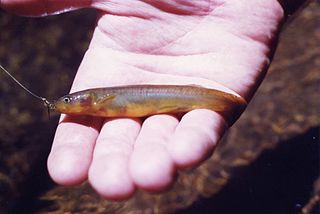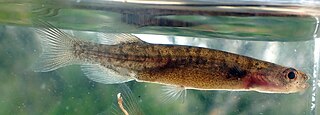
The Galaxiidae are a family of mostly small freshwater fish in the Southern Hemisphere. The majority live in Southern Australia or New Zealand, but some are found in South Africa, southern South America, Lord Howe Island, New Caledonia, and the Falkland Islands. One galaxiid species, the common galaxias, is probably the most widely naturally distributed freshwater fish in the Southern Hemisphere. They are coolwater species, found in temperate latitudes, with only one species known from subtropical habitats. Many specialise in living in cold, high-altitude upland rivers, streams, and lakes.

The mountain galaxias is a species complex of freshwater galaxiid fish found all over southeast Australia.

The common galaxias or inanga is a very widespread Southern Hemisphere fish in the family Galaxiidae. It is a slim, narrow fish with a forked tail and a mottled, spotty pattern, typically about 10 cm (4 in) long when fully grown. It lives in fresh water, but spawns at river mouths and spends the first six months of its life at sea, returning en masse in spring. Its vernacular names include cowfish, jollytail, common jollytail, eel gudgeon, inaka, native trout, pulangi, puye, slippery tarki, spotted minnow, Falklands minnow and whitebait.

The Pedder galaxias is an Australian freshwater fish. It is considered to be extinct in the wild since 2005 by the EPBC Act, and was originally found only in Lake Pedder in Tasmania.

The Chatham mudfish, formerly known as the Chathams galaxias, is a galaxiid fish endemic to two small, peaty lakes in southern Chatham Island, New Zealand.

The banded kōkopu is a galaxiid of the genus Galaxias, found only in New Zealand, including the Chatham and Stewart / Rakiura islands. It commonly grows to 20–25 cm, but has been recorded growing to around 30 cm. Juvenile banded kōkopu are good climbers and can climb up waterfalls and other vertical surfaces by moving into the splash zone and wriggling up the surface, using the water surface tension and their large downturned fins for grip.

The giant kōkopu is a threatened species of ray-finned fish in the genus Galaxias, found only in New Zealand. It can reach up to 58 cm (23 in) in length and 2.7 kg (6.0 lb) in weight, making it the largest species in the family Galaxiidae. It is a mainly lowland species, commonly found in slow-flowing streams, wetlands, lakes, and lagoons. Most populations have an amphidromous life cycle, with larvae going to sea soon after hatching and returning about four months later as small juveniles, 4.5–5 cm (1.8–2.0 in). Juvenile giant kōkopu form a small part of the annual whitebait catch.

The lowland longjaw galaxias is a galaxiid of the genus Galaxias, found only in the South Island of New Zealand, in the Kauru River, a tributary of the Kakanui River in north Otago, and in parts of the upper Waitaki catchment. It grows to a length of up to 7 cm.

Eldon's galaxias is an endangered galaxiid fish endemic to New Zealand. One of several fishes in the genus Galaxias found in Central Otago, it has a very small home range and is at risk of being driven to extinction by trout introduced for recreational fishing.

Gollum galaxias is a galaxiid of the genus Galaxias, found only in southern temperate regions in New Zealand. The species is widespread in rivers throughout the Southland Plains as well as the Von River and Nevis River tributaries of the Clutha River The species is found on Stewart Island / Rakiura, and throughout the Catlins.

Galaxias is a genus of small freshwater fish in the family Galaxiidae, and are frequently referred to as the galaxiids. These highly adaptable fish are typically found at temperate latitudes across the Southern Hemisphere.

Galaxiella is a genus of Australian ray-finned fish of the family Galaxiidae.

Spotted galaxias is a largish, primarily-freshwater galaxias species found in southern Australia. Spotted galaxias are perhaps the most beautiful of the Australian galaxias species. They are a somewhat tubular, deep-bodied fish, with a dusky brownish-red colouration overlain with dark, haloed spots, dramatic black edges to dorsal, anal and pelvic fins, and a dark diagonal stripe through the eye.

Galaxias fontanus, the Swan galaxias, is a species of fish in the family Galaxiidae. It is endemic to eastern Tasmania, Australia.

Arthurs galaxias is a species of ray-finned fish in the family Galaxiidae. It is endemic to Tasmania in Australia.

Gerald Stokell was a New Zealand amateur ichthyologist.
Robert Montgomery McDowall was one of New Zealand's most prominent freshwater ichthyologists.

Galaxias effusus is an extinct species of fish in the genus Galaxias, known only from 23-million-year-old fossils from New Zealand. It is named for its dramatically large dorsal, tail, and anal fins, which are much larger than those of any living New Zealand galaxiid. It is the earliest known member of the Southern Hemisphere family Galaxiiidae.
Galaxias mcdowalli, McDowall's galaxias, is a galaxiid of the genus Galaxias, a member of the Mountain Galaxias species complex group of freshwater fish, found in Australia.
Paragalaxias julianus, also known as the Julian galaxias, is a species of ray-finned fish in the family Galaxiidae. The species is only known from the Central Plateau of Tasmania in Australia and is usually 6 cm (2.4 in) long (SL), the largest specimen ever recorded was 10 cm (3.9 in) long (SL).
















